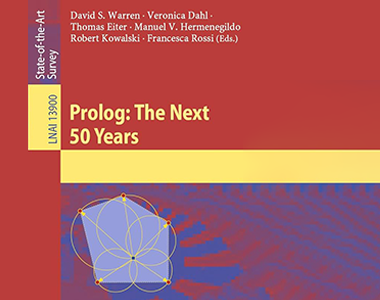Professor David Warren along with Veronica Dahl, Thomas Eiter, Manuel Hermenegildo, and Kowalski Bob recently launched the book Prolog: The Next 50 Years to celebrate the 50th anniversary of Prolog.

Warren, Dahl, and Eiter are collective editors of Prolog: The Next 50 years, which is an essential addition to the field of computer science. Short for “programming in logic,” Prolog is categorized as a programming language that has influenced artificial intelligence and computational linguistics. Unlike other programming languages, Prolog focuses on relations, alternatively known as Facts and Rules. As a declarative programming language, it is suitable for problems that require pattern matching and natural language processing.
The included papers conceptualize Prolog’s future applications for the first time, based on up-to-date definitions and developments within the language. Providing background knowledge such as basic Prolog definitions, use of operators, and more, the abstract’s examples provide readers an opening into understanding a programming language that has not been widely used in commercial settings. One solution to expanding Prolog’s utility is the Janus system, which combines XSB Prolog and Python, creating a hybrid system which helps address these complications. Throughout the book, readers gain an adroit introduction into the programming language and ways Prolog would solve problems using formal logic and predicate calculus.
Additionally, the book explores experiences of teaching Prolog programming and the technology that has helped develop ways of teaching Prolog to students and all those interested in the language. Individuals in multiple sectors are excited about the book’s release with a senior banking advisor noting, “...Declarative languages, such as prolog, could play an important role in the future of AI.”
David Warren is a professor emeritus in the Department of Computer Science at Stony Brook University. His research centers around a variety of topics in the area of logic programming. He was elected an ACM Fellow and was the chair of the department from 1996-1999. Along with this recently published book, he is currently working on another early draft related to breakthroughs in Prolog.
-Kimberly Xiao
